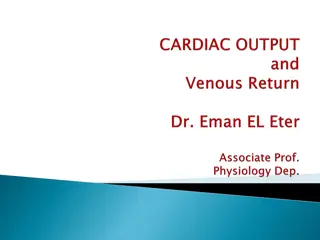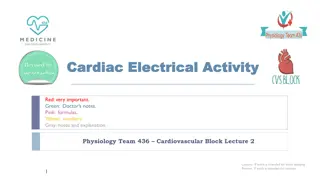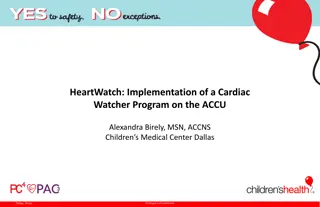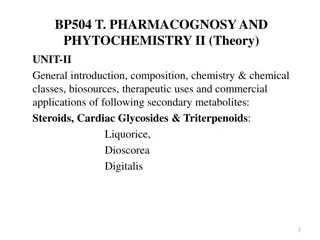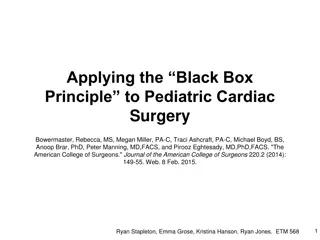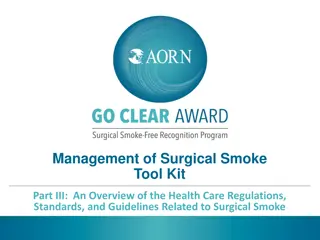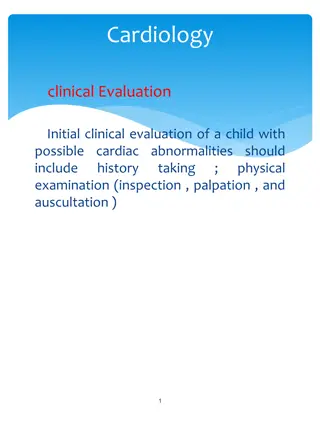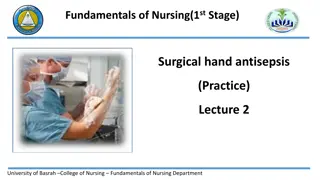Insights from Cardiac Surgical Mission Volunteers
Explore the experiences of cardiac surgery mission volunteers, including challenges faced, patient populations served, years of experience, and more. Learn about intense situations like power outages during surgeries, creating makeshift ECMO circuits, handling poorly maintained equipment, and more.
Uploaded on Sep 16, 2024 | 0 Views
Download Presentation

Please find below an Image/Link to download the presentation.
The content on the website is provided AS IS for your information and personal use only. It may not be sold, licensed, or shared on other websites without obtaining consent from the author.If you encounter any issues during the download, it is possible that the publisher has removed the file from their server.
You are allowed to download the files provided on this website for personal or commercial use, subject to the condition that they are used lawfully. All files are the property of their respective owners.
The content on the website is provided AS IS for your information and personal use only. It may not be sold, licensed, or shared on other websites without obtaining consent from the author.
E N D
Presentation Transcript
50 45 40 35 30 25 yes 20 no 15 10 5 0 Have you ever considered volunteering for cardiac surgical mission?
60 50 40 yes 30 no 20 10 0 Have you ever attended a cardiac surgical mission?
When you attended your first international cardiac surgery humanitarian mission, how many years had you been a perfusionist?
What patient population did you serve during your five most recent missions? What patient population did you serve during your five most recent missions? 80 70 60 50 Percent 40 30 20 10 0 Adult Pediatric Both
T Tell us about a challenging experience you ell us about a challenging experience you encountered encountered I found the challenge of pumping cases with washed cannulae and other "disposables" a bit difficult to get used to. Challenges of using unfamiliar tubing packs and equipment. Lack of safety devices. We were on pump and the power went off. Fortunately the hand crank was handy
Tell us about a challenging experience you Tell us about a challenging experience you encountered encountered Dealing with poorly maintained equipment and very sick patients. Challenges of using unfamiliar tubing packs and equipment. Lack of safety devices. Using pumps without flow numbers and using adult circuits on pediatric patients Could not come off pump, so created an ecmo circuit from a regular oxygenator and tubing - no transducers or monitoring equipment available. Converted from pump to ecmo, went to cath lab, diagnosed that LAD was not where they thought it was and had been cut. Went straight back to OR and did a CABG. Still very poor LV function so remained on ecmo. Sat ecmo during the nights and pumped cases during the day. Heart function never recovered and withdrew care three days later.
T Tell us about a challenging experience you ell us about a challenging experience you encountered encountered Dealing with equipment failure when on CPB. Heater cooler failed. Luckily the local biomed guy was able to make a functional repair and fixed it while I was still on bypass. There will be challenges when you try to run a case exactly as you do in your home hospital. Once you let go of the way you usually do it and trust your clinical skills, the challenges become easier to manage. Earthquake in Ecuador and witnessed a homicide in Honduras
T Tell us about a challenging experience you ell us about a challenging experience you encountered encountered The heater cooler set off an internal breaker. We sent someone to get a replacement, but it took three days to get the part and it was never installed. Using safe equipment/supplies. Had no tubing clamps. Used needle holders as clamps, needed 2 to 3 to go on and come off bypass. I found the challenge of pumping cases with washed cannulae and other "disposables" a bit difficult to get used to.
T Tell us about a challenging experience you ell us about a challenging experience you encountered encountered Challenges of using unfamiliar tubing packs and equipment. Lack of safety devices. Ventilator limitations. Bleeding complications, with staff needing to donate fresh whole blood to stop bleeding Loss of oxygen gas supply from piped in system on one case. Then loss of air on piped in system on a different case Using different donated circuits on every case.
T Tell us about a challenging experience you ell us about a challenging experience you encountered encountered Limited supplies. Resterilizing cannulas for safe use within 24 hours. Like all missions, you have to work with the disposables available. The pediatric tubing packs were very basic and not consistent in content. I was happy that I brought an array of tubing connectors/reducers and extra tubing (various sizes) and hemoconcentrators to minimize hemodilution and blood requirements. I also brought a DLP pressure box and disposables to monitor arterial line pressure as there were no pressure monitors available. The DLP pressure monitoring box saved me from a circuit disruption when I had to emergently resume CPB.
T Tell us about a challenging experience you ell us about a challenging experience you encountered encountered Having the correct disposables available. Random power outages and loosing O2 with no backup O2 tanks available. Equipment, supplies, the food. Equipment and circuit adaptations! Losing heater cooler function and using wall hot water to rewarm patient.
T Tell us about a challenging experience you ell us about a challenging experience you encountered encountered Limited point of care testing, lack of standard safety devices on pump. Everything is challenging. The biggest problem was lack and scarcity of equipment. There s certainly more than one single challenge on any mission, but if I had to categorize, I would say using the perfusion & cardiac surgical resources that are at your disposal, no matter how obsolete or limiting. Creativity and adaptability are things that are cultivated in this kind of work, as far less resources are at your disposal.
T Tell us about a challenging experience you ell us about a challenging experience you encountered encountered Putting together a heart lung machine and piecing together supplies No protective devices on equipment. First and only time I pumped air. Devastating! Just preparation for any issues. Quickly learning the inventory and equipment capabilities so you knew everything in your arsenal. Thankfully we didn't have any true issues. Worst issue was not being able to mount a forane blender on the pump.
Advice Advice It will make you a better perfusionist because you will be forced to challenge the way you have always done your job. Be open minded and flexible. Emphasis on safety should be the same as where you usually practice. Be prepared for unexpected emergencies like gas failure or power failure. Think outside the box Have a very flexible and non-judgmental attitude. Don't forget, you are not in a well-equipped everything is available situation. Be prepared to improvise. Relax. Enjoy working with new people and take it all in.
Advice Advice Smile! Laugh! Show up with an open, positive attitude. It s not going to be like home. Not even remotely. You are there to save lives and educate, not make it like you do it at home. Labor to be the source of positivity, inspiration and most importantly calm on your trip. A bag of candy snuck into the OR tends to help people s attitudes, especially on long days! Bring items for the local team. Pens, lanyards, scrub hats, branded items from your hospital (ask marketing), etc. Cipro Pepto tablets. Eat no vegetables that have not been cooked. No ice in drinks. Brush teeth exclusively with bottled water. Take lots of pictures and keep a journal. Take inventory for the next CCP. Bring educational material for locals. If possible travel and sight see... talk to the locals. Bring scrubs you can leave behind (some countries have trouble getting them). Bring OR hats, masks, shoe covers, disposable gloves, etc. Be flexible, patient and kind to people. Release your expectations to deliver things perfectly, and realize that you are engaging in very difficult work that few healthcare practitioners ever consider.
Advice Advice Be prepared for anything. Lots of imodium / lamodal Reach out to the AmSECT PWOB committee with any questions and advice they might have. Be creative and think outside the box. Every case will be set up differently and be run differently so go with the flow. Be prepared and stay calm. Bring one of everything you need. Have an open mind and help those around you in small ways Be prepared for unexpected events related to equipment, supplies, technique, etc.
Advice Advice Just do it! It will make you a better perfusionist and human being! Bring clothes to donate, including scrubs. Bring your tubing clamps. Take time to teach. Be flexible. Accept and show appreciation for their help and hospitality. Be open to different ideas and techniques Make sure that you have a very good grasp of the basics and refresh yourself in emergency protocols Be willing to improvise. Stick to the basics; if you don't need to get fancy, don't. Know all of your tubing calibrations based on a 15-inch roller. Find out as much as you can ahead of time about the facilities and what you will have to work with. Try to get in contact with a perfusionist that s been to that facility before to find out what you may want to bring or get donated before you go. Be prepared to rig the circuit to meet the patient s needs.
Advice Advice Have patience and a spirit of adventure. Nothing is at your finger tips. Plan and plan again. Get the support of your venders, hospital and society. Learn from your experiences and pay it forward Duct tape is a very valuable tool. Try it, you may like it. I did. Take it very seriously! Have a plan! Try to get as much information on hardware and disposables pre-trip as possible. Relax. Enjoy working with new people and take it all in. Get as much information about the program as you can ahead of time
Advice Advice Keep an open mind . Be prepared to think on your feet and adapt equipment to the situation. Plan, plan, plan and plan. Make sure you get iron-clad guarantees that there is equipment there for you. Be ready for anything. Do the best you can, especially if you do not speak the language Bring all your own tools. There is no such thing as being overprepared mentally for walking into a foreign room and using it shortly there after. Also remember to help teach those around you. Each mission is different, and depends on the team, the hosting organization, and the location. Do your research from all points of view. What ever you do, don't panic!
List the top five List the top five items you would bring on a items you would bring on a mission mission Duct tape! Clip board Stopcocks Flow and valve size nomagrams Tie bands Tool kit: Pliers, multi-tip screw driver Velcro Cannula (can be reused) Bone wax Various connectors etc. to adapt a circuit Head mounted flash light Level sensor tapes Several sharpies, paper tablet, index cards Blunt needles Cheap calculator to leave Coil-in-bucket cardioplegia set
List the top five List the top five items you would bring on a items you would bring on a mission mission Line pressure manometer with pressure Snacks /Starbucks Instant Coffee separators Cipro, Imodium & toilet paper Red DLP pressure box with disposables Willingness to multi-task in the team Tubing clamps Open mind, ability to improvise, sense of Hansen connectors humor PPE/shoe covers/gloves/glasses Sterile blades POCT devices and disposables hemoconcentrators Translation book Blood transfer bags Drug labels scissors
List the top five List the top five items you would bring on a items you would bring on a mission mission Sterile tubing Medical math conversions syringes Antiseptic wipes Flow meter Checklists, charting material Gifts for locals Educational materials
Tell us about an uplifting experience that you remember from one of your Tell us about an uplifting experience that you remember from one of your missions? missions? On my most recent trip to Guyana, a child from the previous mission trip came back to say thank you. It was so rewarding seeing how the child has advanced after receiving surgery. Seeing the gratitude of patients and families!! Watching the blue babies turn pink! The camaraderie one feels with others despite the cultural and language barriers.
Tell us about an uplifting experience that you remember from one of your Tell us about an uplifting experience that you remember from one of your missions? missions? Families are appreciative beyond belief. Feeling like rock stars as we left the country. Our new friends crying and waving and blowing kisses to us. All of the grateful parents and children bringing us flowers and trinkets, smiling and showing their healing, pink children We were able to save this cute little girl with an AP window who couldn't play. Very satisfying to see her able to play
Tell us about an uplifting experience that you remember from one of your Tell us about an uplifting experience that you remember from one of your missions? missions? Doing the first neonatial cardiac surgery in Guyana on an infant born with pulmonary atresia. The patient was born the week before we arrived and only diagnosed during our second week, so they were really lucky The most uplifting experience for me was the gratitude of the patients families. The smiles on parents faces when they were with their child post surgery melted my heart. Also the hard work and effort the whole mission team gave over 12 to 16 hours days was amazing!
Tell us about an uplifting experience that you remember from one of your Tell us about an uplifting experience that you remember from one of your missions? missions? The father of one of the children hugging the surgeon with tears thanking him and not letting go. Took some deflated soccer balls and gave to some of our young patients. Their faces lit up with huge smiles. Too many. It is a humbling experience. Building a program in Uganda over a decade.
Tell us about an uplifting experience that you remember from one of your Tell us about an uplifting experience that you remember from one of your missions? missions? Patient had a high K prior to coming off cpb. Locals were ready to turn off cpb and let patient die. We said wait, we can fix this with zbuf. Every trip I have been involved with always has a special moment which fulfills the reason you chose to serve. It is different for everyone but the overpowering sense of accomplishment accompanies every trip at some point.
Tell us about an uplifting experience that you remember from one of your Tell us about an uplifting experience that you remember from one of your missions? missions? The looks on the parents faces as they see their once cyanotic (blue) children returning from the operating room looking pink. And even the look on some of the kids faces when they look at their finger tips! The hugs from families you have helped. The goodbye hugs from teammates and the newly minted friendships forged during service to others. Playing soccer with (and getting schooled) by a 4 day post-op 8 year old patient! He could finally breathe and run. And boy did he! These kids are tough!










